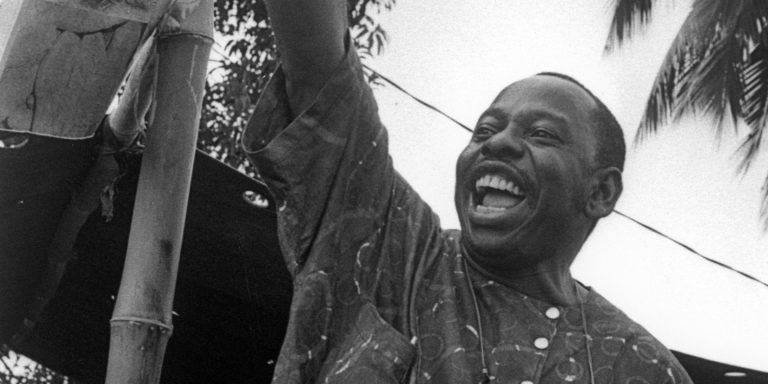Opinon Article
Ken Saro-Wiwa: The Environmental Crusader Who Died Fighting For Nigerian’s Rights — Prince Lahbash

Ken Saro-Wiwa (d. 1995) led a peaceful movement for the environmental and human rights of Nigeria’s Ogoni people whose oil-rich land has been exploited by multinational oil companies. The Nigerian government executed Saro-Wiwa in 1995.
Ken Saro-Wiwa’s name is etched in history, not just as an environmental activist, but as a symbol of resistance in Nigeria’s troubled march toward democracy. His story goes beyond oil spills and environmental degradation in the Niger Delta; it’s a profound case study of how the fight for environmental justice intersects with the quest for democratic governance.
The People’s Hero: A Voice for the Voiceless
In the 1990s, Saro-Wiwa, a writer and leader of the Ogoni people, bravely stood up to multinational corporations and Nigeria’s military dictatorship, calling out the exploitation of the Niger Delta’s resources at the expense of local communities. The devastation caused by oil spills from companies like Shell left Ogoniland polluted and its people impoverished, despite Nigeria’s wealth flowing from the region’s oil.

Saro-Wiwa didn’t just see environmental harm; he saw a democratic deficit—a government that wasn’t listening to its people, that cared more for foreign corporations than its citizens. This made his struggle much bigger than an environmental cause. It was about justice, representation, and the power of the people in a country ruled by military dictators.
Saro-Wiwa’s Execution: A Turning Point for Nigeria
Ken Saro-Wiwa’s life came to a tragic and unjust end in 1995. The military government of General Sani Abacha sentenced him and eight other Ogoni activists to death after a sham trial, accusing them of inciting violence. His execution sent shockwaves around the world, leading to Nigeria’s suspension from the Commonwealth and international outrage.
But Saro-Wiwa’s death wasn’t in vain. It sparked a broader conversation about democracy in Nigeria, highlighting the oppressive nature of military rule and the government’s disregard for human rights. His execution became a rallying cry for those pushing for democratic reforms and accountability, and it cemented his legacy as a martyr for Nigeria’s democracy.
Recommended News:
- Ogun PDP Appoints Asiwaju Akinloye, Dr. Lasisi, Others In Strategic Move To Strengthen Party Leadership
- Olusola Fadipe (Peter Fad) Appointed Special Assistant To Ogun State Governor, Prince Dapo Abiodun
- Comrade Lahbash Urges Nigerian Youths To Lead Innovations As Nation Marks 64th Independence Anniversary
Democracy Through the Lens of Environmental Justice
Saro-Wiwa’s story is a powerful example of how environmental struggles are inseparable from democratic ones. The Ogoni people’s fight wasn’t just about clean air and water—it was about their right to have a say in how their resources were managed, their right to live with dignity, and their right to a government that served their interests. His activism emphasized that true democracy isn’t just about holding elections but about ensuring that all voices, especially those of marginalized communities, are heard and respected.
Even today, the Niger Delta remains a region where democracy is challenged by corruption, environmental degradation, and economic inequality. The lessons from Saro-Wiwa’s fight remain relevant in Nigeria’s ongoing struggle to build a democracy that works for all its citizens, not just the powerful and wealthy.
Conclusion: A Legacy of Courage
Ken Saro-Wiwa’s life and death offer a blueprint for how the fight for democracy must include the fight for justice—environmental, economic, and social. His courage in standing up to the powers that be, knowing full well the risks he faced, is a testament to the strength of ordinary people demanding their rights. In the end, Ken Saro-Wiwa’s story isn’t just about one man; it’s about a country’s struggle to create a democratic system that is fair, just, and inclusive.
As Nigeria continues to face challenges in its democratic journey, Saro-Wiwa’s legacy is a reminder that democracy must be built from the ground up—fueled by the voices of the people it seeks to serve.
























